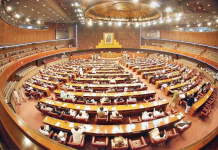KHYBER AGENCY: Afghan stu
dents were issued radio frequency identification (RFID) cards at the Torkham border by Pakistan border security officials to allow them to continue their studies in Pakistan.
Torkham Political Naib Tehsildar Shamsul Islam said that previously in 2016, when the government of Pakistan had started the implementation of a comprehensive border management police at Torkham border to stop illegal movement through the border, no one was allowed to enter Pakistan without legal travelling documents. As a consequence, a large number of Afghan stu
dents who were resi
dents of bord
ering villages of Afghanistan and were studying at private educational institutes in Bacha Mena, a bord
ering area of Pakistan, were among the
affected, he added.
To counter the problem, Pakistani officials formulated a special project through which they issued RFID cards to
affected Afghan stu
dents to allow them to continue their studies without any disruption,
he said.
“The main motive behind this move was to allow the stu
dents to be
nefit from the education offered in Pakistani schools,” he maintained.
He further said that there were 232 applicants, out of which 183, after thorough verification, were issued the cards while the rest of the applications were under process.
To facilitate the students, a special office had been established at Torkham with special machines to allow undisrupted entry at exit, he added.
The official further said that RFID cards was only valid inside the limits of Torkham and could not be used to travel outside of Torkham area.
Zameen Khan, a resident of Afghani bord
ering village Lal Pura and a student of grade 10th in Pak-International Public School Bacha Mena, said that the issuance of RFID cards was nothing short of a privilege because the stu
dents would be able to continue their studies across the border without any disruption.
The stu
dents also expressed their gratitude to government of Pakistan and requested the issuing process to be expedited in order to facilitate the other stu
dents in the village.
Another student, Zar Alam, of Afghanistan said that their village lacked educational facilities and he along with his fellow stu
dents continued his studies in schools across the border in Pakistan.
“I want to receive good education and serve my country,” Alam said.
The stu
dents also complained that many stu
dents missed their Senior School Certificate (SSC) year in 2016 when border crossing was halted due to tensions between Pakistan and Afghan forces at the border. The stu
dents also demanded that the governments of both countries make student friendly policies for the area.
When Aurang Zeb, an uncle of five Afghan students, was contacted to comment on the matter,
he said that most stu
dents were born in Pakistan and were familiar with the Pakistani educational system. He further said that the parents of these stu
dents are always worried about their children until they return home safely because of the distance between their schools and homes and the socio-political hurdles they faced.
He urged the Pak-Afghan authorities to devise and promote policies to facilitate the Pashtuns residing on both sides of the border.
Published in Daily Times, November 6th 2017.











